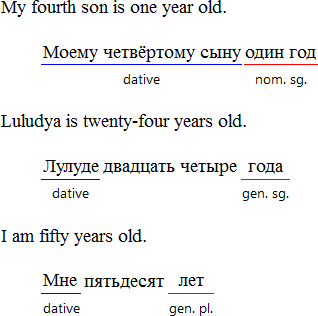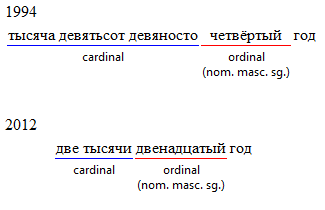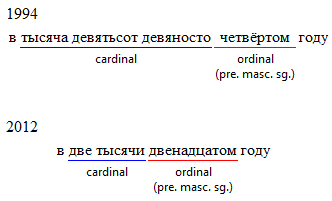Categories: "Time phrases"
Год (часть пятая)
We previously mentioned that if a Russian number phrase is the subject of a verb, except when the number ends in one, it induces neuter singular verb agreement in the past:
| Прошло два года. | Two years went by. |
| Прошло пять лет. | Five years went by. |
| Прошло десять лет. | Ten years went by. |
There is another exception. If the number is preceded by an adjective in the nominative plural, then the verb shows plural agreement in the past:
| Эти два года были очень насыщенными. (adapted from this source) | Those two years were very rich. |
| Все эти пять лет были удачными в финансовом отношении. | All five years were profitable. |
| Те десять лет прошли прекрасно. (adapted from source) | Those ten years went by marvelously. |
Год (часть четвёртая)
Curses. On Saturday I again proposed to Luludya. She insists, despite our five sons, that she can never marry a man who is not Roma. This insistence nonetheless leads me to a certain point of view in this posting. What if Luludya had agreed to marry me? I could have produced many of following sentences.
Let's assume that Luludya and I have been married for more than a year. The first anniversary has passed. In that case, I may freely say:
| Мы женаты уже один год. | We have been married for a year now. |
Interestingly enough, if we use an ordinal number instead of a cardinal number, then we get a different meaning:
| Мы женаты только первый год. | We are in our first year of marriage. |
The use of the ordinal number indicates that the first year has not yet ended. The same thing happens with other years. If our second anniversary has already passed, I can say:
| Мы женаты уже два года. | We have been married for two years now. |
But if our second anniversary hasn't passed yet, we will say:
| Мы женаты уже второй год. | We are in our second year of marriage. |
Let's say you are working at a company. The fifth anniversary of your employment has already passed. You can say either «Я здесь работаю уже пять лет» or «Я здесь работаю уже шестой год». Both sentences say essentially the same thing, but one uses the word пять, and the other uses the word шестой.
And now to return to reality...
| Лулудя отказывается выходить за меня замуж пять лет. | Luludya has refused to marry me for five years. (In other words this is now the sixth year, and she still refuses.) |
| Лулудя отказывается выходить за меня замуж уже шестой год. |
Год (часть третья)
As Luludya and I were smoking clove cigarettes early this morning, she expressed her hope that I would continue to write this blog for many years. It warms my heart to think that a Gypsy woman, born in a wagon and raised among tambourines, should have such hopes for the continued study of the Russian language. Truly, academia enricheth the world, and I, humble slave to Luludya's every request, set to work immediately upon this posting.
As we mentioned yesterday, when subject of the verb, the Russian number one agrees with its noun in gender, number and case. The numbers two, three and four induce the genitive singular of the noun, and most other numbers require the genitive plural. I have not been blessed with daughters, but I desire them mightily, so let us choose some example sentences from the fairer sex:
| Моей дочке один год. | My daughter is one year old. |
| Моей дочке два года. | My daughter is two years old. |
| Моей дочке пять лет. | My daughter is five years old. |
But how shall we say these things in the past tense? Generally speaking, when a number phrase is the grammatical subject of the verb, it induces neuter past tense verb forms. The exceptions are numbers that end in the number one. Those numbers induce singular gender agreement in the verb:
| Моей дочке был один год. | My daughter was one year old. |
| Моей дочке был двадцать один год. | My daughter was twenty-one years old. |
| Моей дочке было два года. | My daughter was two years old. |
| Моей дочке было двадцать два года. | My daughter was twenty-two years old. |
| Моей дочке было пять лет. | My daughter was five years old. |
| Моей дочке было двадцать пять лет. | My daughter was twenty-five years old. |
We need more complex examples. I consider child-rearing the most vital of human functions, so let us choose our examples with such a thing in mind:
| Когда моей дочке был один год, я её поил тигровой кровью. | When my daughter was one year old, I fed her with tiger's blood. |
| Когда моей дочке было два года, я научил её бегать босиком на снегу. | When my daughter was two years old, I taught her to run barefoot on the snow. |
| Когда моей дочке было пять лет, я научил её ловить рыбу голыми руками. | When my daughter was five years old, I taught her to catch fish with her bare hands. |
If number phrases are used as subjects in the future tense, the generally induce 3rd person singular agreement in the verb:
| Моей дочке будет один год. | My daughter will be one year old. |
| Моей дочке будет два года. | My daughter will be two years old. |
| Моей дочке будет пять лет. | My daughter will be five years old. |
Damn, I see by my caller ID that Luludya is calling me again. No doubt she wants me to gather sage for tonight's coming-of-age ritual for her cousin Diana. I must cut this post short and attend to these needs. Until Monday, dearest my readers!
Год (часть вторая)
Thanks so much for all the warm expressions of sympathy yesterday from people about yesterday's misadventure. It is good to know that so many other people have been in similar situations. Falling in love with a Gypsy woman is an overwhelming experience, but after certain conversations today with Luludya's mother, father, grandmother and grandfather, I think it is an experience I can survive, with a judicious application of Bandaids and Neosporin. Even Luludya herself thinks so, which leaves me free to return to my topic of yesterday.
The Russian word for year is год, and, unsurprisingly, it is used to express age. But the age construction in Russian is rather different than the English construction. In English we say, “I am fifty years old”, whereas the Russian equivalent is “to me fifty years”.
The difficulty with the construction for us Yanks and Brits is that Russian numbers are more complex than English numbers. The number один is an adjective and agrees with its noun, so one year is один год. Numbers whose spoken form ends in два, две, три and четыре require the genitive singular of the noun they quantify, which gives us два/три/четыре года. Most nominative case numbers whose spoken form ends in something other than those just mentioned require the genitive plural of the noun they quantify, thus пять лет, шесть лет, etc. That's right: the genitive plural form of год after numbers is лет. Don't ask questions. Just believe. This brings us to the following grammatical analyses:

Of course, we can use years to express many other things than age. For instance, duration phrases use numbers. Most time/duration phrases are in the accusative case, which copies the nominative for inanimate phrases:
| I have loved a Gypsy woman for six years. | Я шесть лет люблю цыганку. |
| Four years ago a Gypsy woman gave me a second son. | Четыре года назад цыганка мне родила второго сына. |
| Уже один год как какой-то тип пристаёт к моей девушке. | For one year now a certain jerk has been hitting on my girl. |
There is a bit more to say on this subject, but I see Luludya's number on my caller ID and I must attend to her immediately lest she become testy. More tomorrow!
Год (часть первая)
I awoke this morning with the newly-risen sun shining mercilessly in my eyes, my back propped against a mesquite tree. The cacti on either side of me and a couple of jack rabbits munching on scrub grass indicated that I had slept the night in the desert. Hmph. No tent. No sleeping bag. Apparently Luludya and her compatriots had abandoned me here last night. “I must refrain from carousing with Albanian Gypsies,” methought. “It leads to complications in the morning.” Slowly I worked an arm free and unknotted the twine binding my legs, coiling the rope neatly out of old Arizona habit. (One should never leave rope uncoiled.) I slowly stood, magnificently maintaining my balance and frantically searching my mind for some details of the preceding evening. “Lord,” I thought groggily to myself in Russian, “I can't even remember what year it is. What year is it, Lord?” And then to my profound embarrassment I realized that if my students were to find themselves in a similar situation, they might not know how to pose that very question in the language of Lermontov. Thus this posting was composed as I wended my shoeless way to the nearest paved road.
The Russian word for year is год. “What year” is «какой год», but the Russians usually throw a «сейчас» or an «у нас» in the middle to show they have the current year in mind.
Now, let's get to the year itself. When Americans see a year like 1994, we divide the number into two sets of two digits and read it aloud as “nineteen ninety-four.” The Russians never do that. Instead they literally say the one “thousand nine hundred ninety-fourth year,” which comes out:
Americans read a year like 2012 as “two thousand twelve” or “twenty twelve,” whereas the Russians say literally the “two thousands twelfth year,” which comes out:
Thus one could have conversations like this:
| “What year is it?” “It's two thousand twelve.” |
— Какой сейчас год? — Две тысячи двенадцатый год. |
| “What year is it?” “It's two thousand thirteen.” |
— Какой у нас год? — Две тысячи тринадцатый год. |
Notice that the year is expressed as an ordinal number, and that ordinal numbers are ordinal only in their last unit. In other words, in Russian and English one says “thirty-seventh”, not “thirtieth seventh.” That's not necessarily true in all languages, by the way. The Poles use the “thirtieth seventh” option in their language, putting the last two digits in the ordinal form. Here's the Russian version:

Now here's where it gets interesting. If you want to say the year in which something does/did/will happen, then the phrase must come after the preposition в in the prepositional case:

Do you see that году bit? You might be tempted to consider it a dative form, but it is actually a specialized prepositional case form (sometimes called the locative case). Thus the ordinal number, which is an adjective in terms of its endings, must agree with году, becoming masculine prepositional singular, resulting in dialogues like these:
| “When did you meet Luludya?” “She and I met in 1997.” |
— Когда ты познакомился с Лулудей? — Мы с ней познакомились в тысяча девятьсот девяносто седьмом году. |
| “When was your fifth son born?” “My fifth son was born in two thousand two.” |
— Когда родился твой пятый сын? — Мой пятый сын родился в две тысячи втором году. |
It's not all that complicated when someone explains it in a straight forward fashion, eh? Which is not to say that life never has complications. For instance, later today I must track down Luludya to retrieve my wallet and credit cards.